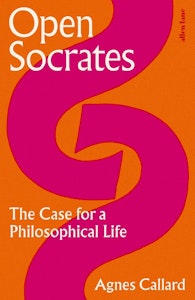This article is taken from the April 2025 issue of The Critic. To get the full magazine why not subscribe? Right now we’re offering five issues for just £10.
In Open Socrates, the philosopher Agnes Callard asks what it means to live an ethical, fulfilling life and decides, more or less, that it means being like the philosopher Agnes Callard. She is, it seems clear, relentlessly inquisitive and thinks we would be better off being relentlessly inquisitive.
This sounds more cruel than I intend to be. Open Socrates is about the value of philosophical dialogue, and I imagine that it would be a lot of fun to talk about philosophy with Agnes Callard. Her book is lively, good-natured and thought-provoking.
Still, we can have warm acquaintances with a knack for winding us up. I agree with Callard that we are too resistant to asking deep questions of each other and ourselves. I feel like we should pursue “meaning” in a sense that transcends individual perspectives. But I think that Callard errs by universalising the desire for the objective. “We learn to take life fifteen minutes at a time,” she writes, “postponing philosophical inquiry.”
It is when we converse, that we make intellectual progress
If we postpone for long enough, death will rescue us from ever having to come to terms with the meaninglessness of life.
Actually, I think a lot of people are satisfied with the local significance of watching their children develop, or refining their skills, or birdwatching. Callard uses Leo Tolstoy as a case study in what can happen to a person when their cosy existential perspective collapses, but the author of Anna Karenina and War and Peace is hardly a typical human being.
Still, the fact that people are content to live like this does not mean that they should be. Callard wants to shake up our preconceptions. Here, she introduces her hero: Socrates. Like her icon, she is a controversial philosopher, though in these shallow times she has been controversial over subjects such as her unconventional romantic arrangements and her austere attitude towards Halloween candy. She prefers being controversial for asking untimely questions — such as publicly pondering whether she should get an abortion when she became pregnant.
It is this compulsion to discuss that makes Callard seem peculiar. Whatever our attitudes towards abortion, none of us could claim that it is unusual to consider having one. It is the desire to discuss what is generally a private act that seems subversive. But Callard’s argument in Open Socrates is that thinking is more of a “social process” than a “private mental activity”. It is when we converse, and especially when we engage in what she calls “inquisitive refutation”, that we make intellectual progress.

I think Callard is right to question some of our anxieties about this sort of dialogue. For example, recently somebody posed an ethical question that had never struck me, and instead of answering them I said that I would “think about it”.
It was true that I had no good answers. But did I want to “think about it” because I would formulate a good answer alone or because I was embarrassed about giving tentative or ill-considered answers? If the latter is the case, and I think it might well have been, then I was more concerned with being seen to be right than I was with what was true.
Perhaps I should have tried to answer after all. But we should be careful when it comes to hammering the human consciousness into shape. Callard grants that her approach to life is “intellectualist” and that people have “a strong aversion to intellectualism”. True enough — and this can be misguided. Still, I do not think one must be anti-intellectual to conclude that Callard’s aspirations to intellectualism are excessive.
A chapter applying Socratic rigour to “equality” makes the thoughtful argument that equality, if it means anything valuable, is not just a “negative sense” of being equal but a sense of “trying, together, to be … elevated”. True enough. Indeed, I’d say it’s downright refreshing. A snide quibble is that more practically it means everyone being able to see a doctor when they are sick.
More pertinently to my criticism, though, Callard illustrates her argument by recalling a snatch of conversation that is beautiful in its human spontaneity. For all the value of philtrum-pinching Socratic dialogue, in other words — about which Callard writes with undeniable passion and perceptiveness — what remains unsystematic and even unreflective in human thought and experience will keep enlightening us for as long as we allow it to do so.
Now, I’m off to ask myself some untimely questions. Is there a God? What does “justice” mean in a world where bad men trample on the bodies of the virtuous? Do capers taste good in lasagna? Will I die alone?







